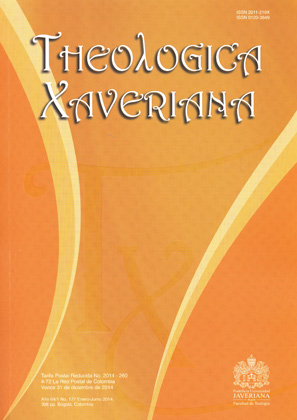Abstract
¿Cuál es el punto de partida de la teología? ¿Una experiencia espiritual o un asentimiento a un lenguaje religioso? La teología posliberal en Estados Unidos ha retomado este debate iniciado a principios del siglo XX en Europa. Al seguir las contribuciones de la fenomenología y de la filosofía del lenguaje, el presente artículo pretende clarificar la relación entre la fe, las distintas formulaciones lingüísticas (dogmáticas, litúrgicas, etc.), la razón y la praxis. ¿Se trata de un encuentro extrínseco entre la fe, la razón (teológica) y la praxis (evangélica) o de una relación esencial entre las tres? Seguiremos las contribuciones de Jean Ladrière y de Xavier Zubiri en diálogo con Heidegger, Rahner, Lonergan, Barth y Lindbeck.
Esta revista científica se encuentra registrada bajo la licencia Creative Commons Reconocimiento 4.0 Internacional. Por lo tanto, esta obra se puede reproducir, distribuir y comunicar públicamente en formato digital, siempre que se reconozca el nombre de los autores y a la Pontificia Universidad Javeriana. Se permite citar, adaptar, transformar, autoarchivar, republicar y crear a partir del material, para cualquier finalidad (incluso comercial), siempre que se reconozca adecuadamente la autoría, se proporcione un enlace a la obra original y se indique si se han realizado cambios. La Pontificia Universidad Javeriana no retiene los derechos sobre las obras publicadas y los contenidos son responsabilidad exclusiva de los autores, quienes conservan sus derechos morales, intelectuales, de privacidad y publicidad.
El aval sobre la intervención de la obra (revisión, corrección de estilo, traducción, diagramación) y su posterior divulgación se otorga mediante una licencia de uso y no a través de una cesión de derechos, lo que representa que la revista y la Pontificia Universidad Javeriana se eximen de cualquier responsabilidad que se pueda derivar de una mala práctica ética por parte de los autores. En consecuencia de la protección brindada por la licencia de uso, la revista no se encuentra en la obligación de publicar retractaciones o modificar la información ya publicada, a no ser que la errata surja del proceso de gestión editorial. La publicación de contenidos en esta revista no representa regalías para los contribuyentes.


